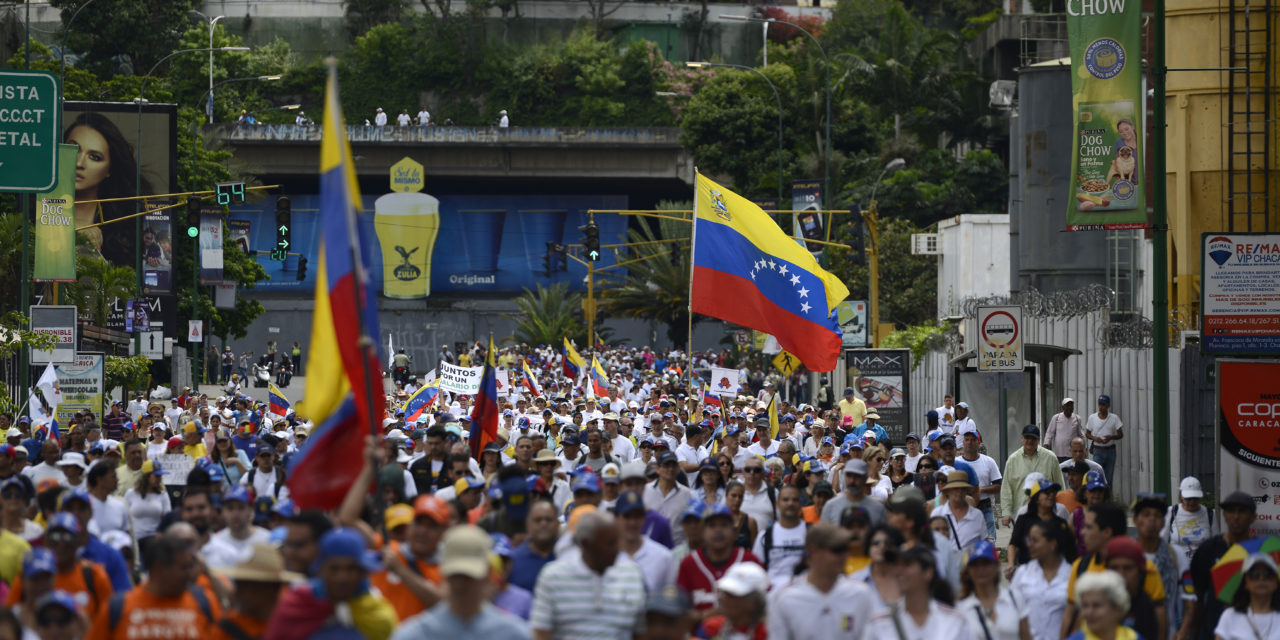Google Translate available in: Español
(AP Photo/Matias Delacroix)
As the crisis in Venezuela continues, the Observatorio Venezolano de Conflicto Social (OVCS) has been one of the main organizations researching and documenting protest trends since 2011. While the organization is still tracking data for 2022, the first semester of the year (January-June) has shown a 15% increase in protests compared to the same period last year. With a total of 3,892 protests taking place from January to June 2022, averaging 22 a day, these numbers suggest that Venezuelans continue to be mobilized in asserting their human rights.
The OVCS defines a “protest” as any citizen action or mobilization that demands human rights which are protected by the Constitution of the Bolivarian Republic of Venezuela and the International Legal Order. Hence, for an action to be included in the protest database, it must be related to the demand or promotion of human rights. OVCS includes mass and individual actions, regardless of whether they are a large mobilization or a single person on a hunger strike, as long as the purpose of the action is to demand human rights. However, OVCS only includes actions in their database that are carried out in person, not campaigns carried out virtually through social networks. OVCS gathers their data through national and regional media, as well as sources from official agencies and non-governmental organizations.
In the first semester of 2022, 2,856 documented protests were related to economic, social, cultural and environmental rights, representing 73% of the total protests documented. The primary concern within this category of protests was labor rights, with 1,642 protests related to this issue. However other salient issues motivating these protests include the collapse of basic social services and lack of effective solutions by the government, as well as the deteriorating state of the health system, with scarce materials and medical equipment available to provide for the population. The remaining 27% of these protests were characterized by concerns related to civil and political rights, as citizens mobilized to protest the persecution, criminalization and detention of human rights defenders, humanitarian workers and members of civil society, as well as procedural delays and prison conditions for people deprived of liberty.
However, while the number of protests in the first half of this year has increased slightly from the same time period in 2021, they are still significantly lower than the highest peaks of the protests in 2017. As a year in which the protest movement in Venezuela reached new heights and gained international attention, 2017 hit a record number of 9,787 protests taking place throughout the year. In comparison to what has been documented thus far for 2022, the 2017 protests included more diverse participation, especially in terms of socioeconomic status, and centered more around political rights; the largest demands being the opening of a humanitarian channel, freedom for political prisoners and an electoral timetable. There was also significantly more repression of protest and violence documented in 2017, when the Maduro government implemented a response to the protests that saw systematic repression by state security, pro-government armed groups, and individuals. This repression contributed to violence in the 2017 protests, with violent action documented by OVCS in at least 523 protests. There were at least 124 people killed, and the Office of High Commissioner for Human Rights found that security forces (mainly the National Guard) were allegedly responsible for at least 46 of these killings.
In the first semester of 2022, the OVCS reports that there has been less violence and repression documented in the context of protests than there was in 2017. While there was repression documented in 52 protests in 14 states, there have been no deaths recorded. However, according to OVCS, this decrease in repressive behavior by the state security institutions and bodies of armed civilians may be due to the investigations, monitoring and documentation currently being carried out by international human rights mechanisms such as the UN Fact Finding Mission on Venezuela (FFM). Local civil society organizations routinely refer to the FFM as a “containing wall” that has prevented conditions in the country from being even worse than they are, illustrating the importance of continued international accountability efforts in response to Venezuela’s human rights crisis.



